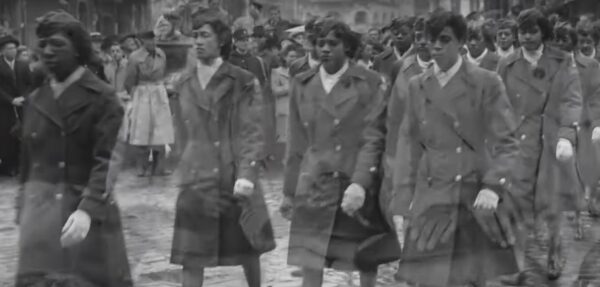On the last day of Black History Month, Congress voted to recognize with the Congressional Gold Medal the only all-female, Black unit to serve in Europe during World War II.

The little-known troops were assigned to sort and deliver mail to Army soldiers, understanding the importance that communication played in the winning of that war.
The House voted unanimously (422-0) to award the 6888th Central Postal Directory Battalion with the Congressional Gold Medal, the highest expression of national appreciation for distinguished achievements and contributions bestowed by Congress to individuals, institutions, or groups.
The bill was sponsored by Wisconsin Rep. Gwen Moore, who was inspired to push for the recognition after meeting the daughter of 6888th member Anna Mae Robertson. She had 295 co-sponsors on the bill that was first introduced in 2019.
In 2021, the Senate passed legislation to salute the group of 850 African-American women, known affectionately as “Six Triple Eight.” Of the original Six Triple Eights, only a half-dozen are still alive.
One of those surviving members, Maj. Fannie Griffin McClendon, a 101-year-old Arizona resident, said that the honor is “overwhelming.”
“It’s something I never even thought about it,” she said when told about the vote to honor her for her outstanding service. “I don’t know if I can stand this.”
Most people might not think about the importance of the work the Six Triple Eights did, but they were instrumental in keeping the morale high for people serving the nation during the war.
Their duties were to sort and route mail for millions of members of the American military and their friends and family back home.
The U.S. Army Center of Military History states that in 1945, when the first contingent of the battalion set sail for Europe, they were immediately faced with the dangers of war. First, the ship that they were on almost was struck by Nazi U-boats.
Then, when they arrived in Glasgow, Scotland, a German V-1 rocket exploded near the dock where their ship was parked, and the women had to run to safety.
The women were stationed in Birmingham, England, where they were forced to work in “warehouses stacked to the ceiling with letters and packages. These buildings were unheated and dimly lit, the windows blacked out to prevent light showing during nighttime air raids,” according to a history log.
“Rats sought out packages of spoiled cakes and cookies. As it was a cold winter, the women wore long johns and extra layers of clothing under their coats while working in these warehouses. The unit members were organized into three separate eight-hour shifts so work continued around the clock, seven days a week. They tracked individual service members by maintaining about seven million information cards including serial numbers to distinguish different individuals with the same name.”
The women in the Six Triple Eight were innovators, who also invented a new tracking system that allowed them to process an average of 65,000 pieces of mail per shift. With this system, they were able to clear 17 million pieces of mail trapped in the six-month mail backlog within three months, essentially solving the military’s postal problems.
After their work was complete in Birmingham, the battalion also served in France before returning to the United States.
Rep. Moore stated that part of the reason she got behind the bill to get them honored was that they were “a trailblazing group of heroes who were the only all-Black, Women Army Corps Battalion to serve overseas during World War II.”
She added, “Facing both racism and sexism in a warzone, these women sorted millions of pieces of mail, closing massive mail backlogs, and ensuring service members received letters from their loved ones. A Congressional Gold Medal is only fitting for these veterans who received little recognition for their service after returning home.”
Other honors have been in place to celebrate these women.
The late Doris Moore became the first Black social worker in New Hampshire, according to her family.
Her state’s congressman Rep. Chris Pappas saluted her contribution in the unit, calling her and the women that served with her “trailblazers and patriots.”
Elizabeth Barker Johnson, one of the Six Triple Eight women, was the first female to attend Winston-Salem State University in North Carolina on the GI Bill.
Almost four years ago, in 2018, the City of Fort Leavenworth, Kansas, erected a monument to honor the women.
The next year, according to the National Association of Black Military Women, the battalion received the Meritorious Unit Commendation on International Women’s Day in 2019.
Kansas senator Jerry Moran (R) announced the award, saying he was “pleased” to be a part of the tribute almost three years ago to the date. He also noted, “As we celebrate Black History Month and the start of Women’s History Month, it is important we pause to recognize the contributions and service of this historic unit.”
The same year of the commendation, a documentary titled “The Six Triple Eight” was made about them. Their story is extraordinary as it talks about the 855 Black women that enlisted in the Women’s Army Corps and were sent to Europe, England and France to address the backlog of mail stopping American soldiers from receiving mail in from the European Theater of Operations.
On Monday, as they voted on distinguishing the group with the Congressional Gold Medal, they also voted to rename the Central Park Post Office in Buffalo, New York, after one of the members of the battalion that died in 2020, at the age of 98. Now that federal building will be named the “Indiana Hunt-Martin Post Office Building.”
New York Democratic Rep. Brian Higgins, who sponsored the post office bill and co-sponsored the Congressional Gold Medal bill, spoke on Hunt-Martin’s amazing contribution to the civil liberties of our nation.
He wrote, “Throughout her life and military service, Indiana Hunt-Martin experienced racism and sexism firsthand, but no amount of discrimination prevented her from serving her country. Her courage and bravery paved the way for future generations of African American women serving in the military.”
Retired Col. Edna Cummings, who co-produced the documentary, “The Six Triple Eight,” and helped erect a monument at Fort Leavenworth, was moved by the recent honor. She said, “I’m grateful to the 6888 veterans, families, and thousands of supporters who worked to make this Congressional Gold Medal vision a reality.”
Now that the bill has passed in the Senate and the Congress, it will go to President Joe Biden for him to sign into law.
More news from our partners:


